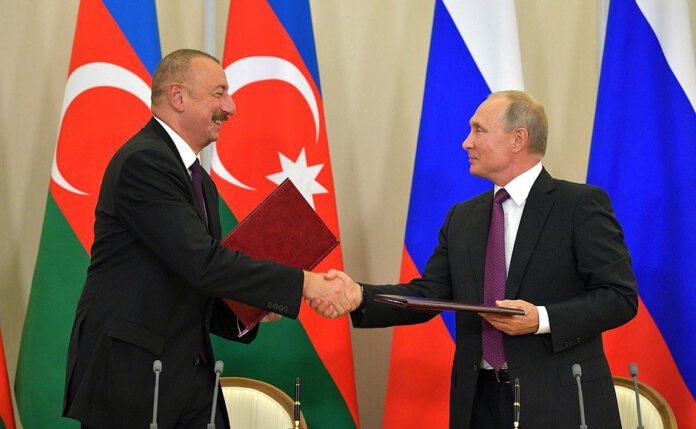
Positioned strategically at the crossroads of Europe and Asia, Azerbaijan holds the strongest comprehensive strength in the South Caucasus. This year, it has actively signaled interest in joining the BRICS cooperation framework, a move publicly supported by China and Russia.
On August 20, Azerbaijan formally applied for BRICS membership, marking a significant step toward its inclusion in this influential bloc.
Domestically, Azerbaijan completed two major political milestones this year. First, the country’s reunification was solidified. Since gaining independence, Azerbaijan has prioritized resolving its longstanding dispute with Armenia over the Nagorno-Karabakh region, a historical conflict that has dominated its domestic and foreign policies. In 2020, escalating tensions and a shifting international environment led to the Second NK War, enabling Azerbaijan to reclaim surrounding territories.
By 2023, an ‘anti-terrorist operation’ in Nagorno-Karabakh restored full sovereignty over the area, culminating in the dissolution of the Republic of Nagorno-Karabakh in 2024. Secondly, with a strong mandate following the reunification, President Ilham Aliyev secured a fifth term with over 90% of the vote, while the New Azerbaijan Party retained its parliamentary majority. This political stability has strengthened public cohesion and sustained national unity.
With internal stability, Azerbaijan is increasingly focused on advancing its foreign policy, with BRICS membership poised to bolster its national interests. Economically, the BRICS countries are critical partners for Azerbaijan’s growth, especially given the nation’s reliance on hydrocarbon resources, which contribute 92% of export revenue and over half of national income. While EU countries currently represent 48.5% of Azerbaijan’s trade, BRICS nations are rapidly increasing their global economic share and are pivotal for Azerbaijan’s diversification efforts. In 2023, BRICS nations accounted for approximately 20% of Azerbaijan’s foreign trade, with Russia, China, and India ranked as its third, fourth, and seventh largest trading partners, respectively.
Beyond energy, Azerbaijan aims to capitalize on its geographic advantage as a key transport hub. From an east-west perspective, it anchors the Trans-Caspian Transport Corridor (TCTC), connecting China, Central Asia, Turkey, and Europe. North-south, Azerbaijan also serves as a critical link for Russia’s planned corridor to Iran and India. Through BRICS, Azerbaijan can enhance its positioning within these corridors, strengthening its role in regional transport and geostrategic alliances.
Azerbaijan, aiming to secure more diplomatic space and bolster its regional and international influence, is committed to a balanced foreign policy approach distinct from its neighbors. While it maintains amicable relations with EU nations, it remains cautious about EU membership.
Similarly, it cooperates with Russia without joining any Russia-led economic or security alliances and holds strong ties with Turkey as a member of the Organization of Turkic States. Following the escalation of the Ukrainian crisis in 2022, Azerbaijan’s geopolitical significance has grown, driven by its energy resources and strategic location. Leveraging its advantageous position, Azerbaijan has increasingly engaged in non-exclusive international organizations, seeking greater influence while preserving its balanced stance. In line with this, it upgraded its dialogue partner status in the Shanghai Cooperation Organization (SCO) in July and applied to join BRICS in August. Azerbaijan will also host the 29th UN Climate Change Conference in November, underscoring its active role on the global stage.
Azerbaijan’s BRICS application reflects shifting diplomatic dynamics in the South Caucasus, while highlighting the attraction of BRICS itself. This development raises two key considerations.
First, how will the interplay of major powers and the hedging strategies of smaller states reshape the South Caucasus? Azerbaijan, Armenia, and Georgia—marked by ethnic, religious, and linguistic diversity—have yet to pursue regional integration, creating a fertile ground for external influence.
Russia and the West both view Azerbaijan as essential for establishing transport and energy corridors that bypass each other. Following the Ukrainian crisis, as Russia’s focus shifts, the West has increased its presence in the region, intensifying the geopolitical landscape. Azerbaijan leverages this competitive environment to secure the most advantageous position, while Armenia strengthens ties with the West, though still pursuing energy and transport cooperation with Russia. Armenia’s BRICS application, coming just after a visit from President Putin, further demonstrates its interest in multilateralism as a hedging strategy, suggesting that the South Caucasus’ geopolitical future will only grow more intricate.
Second, what direction will BRICS take? This year marked the bloc’s first expansion, admitting Egypt, the UAE, Iran, Ethiopia, and Saudi Arabia, a move that underscores BRICS’ role in a multipolar world. With approximately 40 more countries expressing interest in joining, BRICS faces new challenges in managing its growth. Following its recent expansion, BRICS has opted for a temporary pause in accepting new members, focusing on integrating its latest additions—a stance confirmed by Russian Foreign Minister Sergey Lavrov. In the future, BRICS may pursue broader partnerships, creating a partner country framework to engage more nations without compromising its core identity.
Despite these complexities, BRICS is undeniably solidifying its status as a key platform for developing nations to amplify their voices, protect their interests, and shape global governance. The organization stands at a pivotal juncture as it evolves to meet the demands of a multipolar world.
Source: ishizhi, Daily Sabah, X



